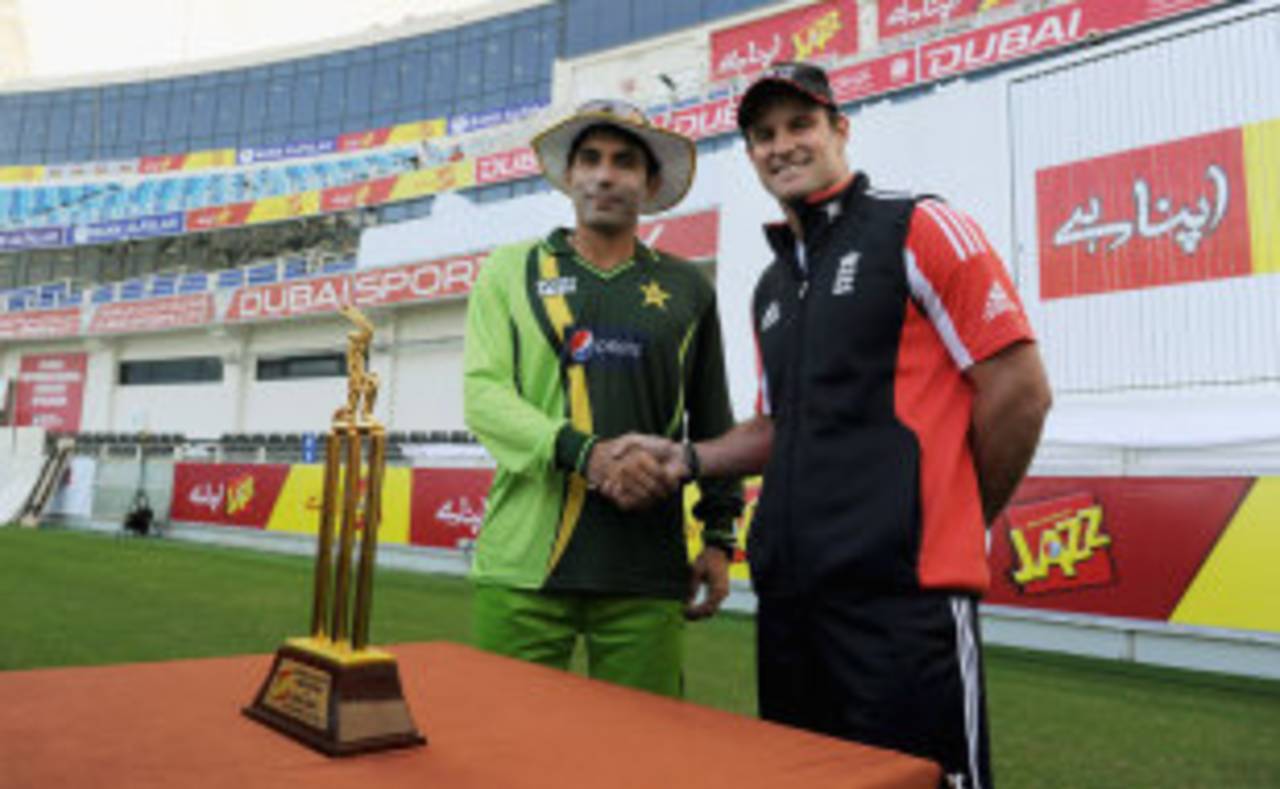The tortoise can triumph
When Pakistan play England, to paraphrase Coldplay, every series is a watershed. Confrontations are frequent, disagreements a ritual
Kamran Abbasi
Feb 25, 2013, 11:26 PM

The cricket in this series should be fascinating enough before the inevitable controversies interfere • AFP
When Pakistan play England, to paraphrase Coldplay, every series is a watershed. Confrontations are frequent, disagreements a ritual. Fifty years of competition have brought us a rivalry infused with socio-political significance. When the malodour of colonial rule began to evaporate, radicals nearer to home and neo-conservatives abroad blew another ill wind through the senses of these cricketing combatants. Both parties have periodically made pledges of mutual respect and bonhomie but the heat of battle tends to create heat, not light.
Certain Pakistan cricketers brought disgrace to English shores in 2010, and that memory will be hard to shake as this series unravels. England arrive in the United Arab Emirates, Pakistan's exile home, with a stain on their domestic game courtesy of the recent spot-fixing verdict against Mervyn Westfield. As unfortunate as the Westfield case is, it serves to remind players and commentators that corruption in cricket is not a uniquely Pakistani problem, ironically helping to tone down the tension of this series.
Indeed, a series that might have been previewed with dread has become a stimulus for enthusiasm. England are undisputed world champions, Pakistan a surprisingly close second in Test success in the last 12 months. In that period, England scored at the fastest run rate of all teams, while Pakistan bettered only Zimbabwe; forget Imran versus Botham and Wasim versus Atherton, welcome tortoise versus hare.
England's status has yet to be challenged in Asian conditions, and the conditions in UAE approximate closely to those in Lahore and Karachi. Misbah-ul-Haq's side has been strong in this environment, even without Saeed Ajmal's teesra. The cricket in this series should be fascinating enough before the inevitable controversies interfere.
Despite a successful year both teams face selection issues. Tim Bresnan's injury means that England lose a little balance to their team, which makes the inclusion of a second spinner a bigger gamble. Pakistan's success in UAE has been based on depth in quality spin-bowling, a lesson England would do well to heed.
Pakistan's current batsmen are generally less adept against spin than other Asian sides, and Graeme Swann and Monty Panesar will generate more panic than James Anderson and his fellow pacemen. England, though, might be reluctant to start the first Test with Anderson and Broad as their only fast bowlers.
Pakistan's strength remains with their bowlers, where Ajmal will pose the greatest threat to England's formidable batting line up. With Umar Gul's ability to reverse swing and Mohammad Hafeez's back-up offspin, Pakistan's attack has more depth in these conditions than England's. Wahab Riaz, a player who adds some extra pace, batting potential, as well as needle to the contest, would be my choice to support Gul. Pakistan retain that precious ability to plunder wickets in sudden bursts, turning a match on its head. England will need to be wary of such moments.
The key to the contest, however, might be scoring rate. Pakistan's defensive approach has been born of necessity, and plays to the strengths of its batsmen, especially the senior pros Misbah and Younis Khan. The tactic has worked admirably thus far but Pakistan might have to risk a little to challenge England, the best team they have played in this new era. A need for speed argues for a recall for Umar Akmal, an attacking batsman capable of middle-order acceleration, probably in place of Asad Shafiq. If that change is made it will signal a subtle change in mindset in the Pakistan camp.
The next few weeks are important for both countries; England determined to underline their number one status and Pakistan facing a stern examination of their revival. The series seems set to be hard fought, decided by a small margin. The result is a hard one to call, which adds to the anticipation, but 'home' advantage will give Pakistan an edge and Misbah's tuk-tuk merchants have every chance of completing a tortoise-like crawl to victory.
Kamran Abbasi is an editor, writer and broadcaster. He tweets here